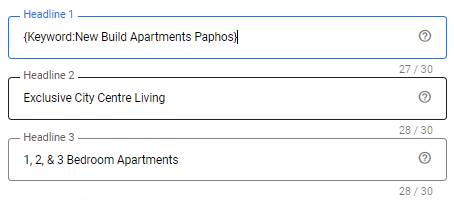PPC advertising is one of the most popular ways in which you can get traffic to your website, and it is something that Real Estate Agents should definitely be encouraged to consider. Most people initially think of Google when it comes to searching the web, but there are alternatives, such as Bing, Yahoo, YouTube and even Social Media that can help increase visibility and attract potential business.

PPC advertising is a highly engaging way to promote your Estate Agent Business and drive traffic to your website. PPC adverts show in search results and you only pay when someone clicks on the link to go to the website. You also have full control over how much you are willing to spend and can set budgets to ensure you do not overspend.
According to both Wordstream and Search Engine land, approximately 65% of all clicks made by users are to paid advertising. The Estate industry typically ranges from between £0.02p per click (own brand name) and £0.97per click (high competition keywords). However, if the account is looked after and monitored closely it is possible to get the Cost Per Click substantially lower.
Even if your ad does not get clicked on it can increase brand awareness to your target audience free of charge.
By implementing the tips and techniques illustrated below in your digital marketing you will find that you can drive people to your Real Estate Website instantly. Once your campaigns are set up, you can generate traffic from people clicking on the ads to make their way to your website. It is a quick way to get your company visible at the top of search results.
Interesting Facts:
The Google Search Network is probably what people are more familiar with. When a user types a query into the search box, the results are displayed based on several hundred calculations and algorithms by Google to ensure the most relevant results are shown at the top of the page. The first two or three search results are usually paid ads, followed by a series of organic search results, with often some further paid ads towards the bottom of the page.
Let’s assume the number one position for the keyword ‘Property in Marbella’ is £0.50p, and you have a bid of £0.40p you will not get the top spot, but your ad may show in second or third. You could increase the bid to £0.51 to achieve top spot, however, this will drive costs up. It’s a better idea to look at the keyword and see if the ad can be changed to incorporate the search term or look to advertise this specific ad at times when the Cost Per Click is lower. This will increase Google’s (or other search engines) trust in the keyword and reward you with a lower Cost per Click.
There are several other factors within Google adwords to be taken into account when determining if you will show in the 1st position and that’s why it is important to have regular maintenance and optimisations.
The Display network differs in that search results are often shown on other web pages. You may have noticed then when you are looking at a website and you see a banner or advert showing up (usually at the top) on the page. The benefits of this are that the ads can be targeted to the audience and specific websites. It is also much cheaper to advertise on the search network.
The Real Estate Sector has a conversion rate of 0.53% on the Display Network and 4.23% on the Search Network. Conversion rates are usually lower for the Display Network because they are often used for brand awareness or to offer promotions, however, this does not mean they are any less important.
PPC (Pay Per Click) is a service offered by Google (and other search engines) to promote your website and show it to people who are interested in visiting your real estate website. Due to the wide array of competitors in digital marketing, it is important that campaigns are created with the user in mind and keywords are specific to what the customer actually requires. If someone types in ‘Marbella property for sale‘ and this fits your market then you know you have a potential customer.
Also, it is important that your Website Design is structured correctly in a way that all text adverts are directed to relevant landing pages where the content reflects what the customer is expecting.
With PPC you know that you are delivering results to the targeted people at the exact moment they are showing interest. Also, you are advertising to someone who is probably at the first stage of their journey, so this is the ideal opportunity to gain trust, and confidence and help them most. By doing this you are far more likely to achieve success and generate a conversion or enquiry.
The first thing to consider is location targeting. With Pay Per Click you can target your ads to specific geographical locations. This is extremely useful because one of the most common search terms includes the phrase “Estate agent near me”. By having a Google My Business account also linked it is possible that the search results will show a map of your location.
Location targeting allows your ads to appear in the geographic locations that you choose: countries, cities, towns, or places of interest (beach, local amenities etc).
Focus and bid more on specific locations in your targeted area, and incrementally bid lower the further from the specified target location, as the quality of the lead will be decreasing.
As the Real Estate agency becomes more and more competitive it is important to ensure your brand is as prominent as possible. Real estate searchers learn about the brands in a multitude of ways but the most common method is a search for the company name on Google or another search engine (branded search).
Potential customers searching for your company are far more likely to be your hottest leads, so it is important that you are bidding on your own name (you can be assured that your competitors will be doing the same to you). Bidding on your own brand name is also significantly cheaper than generic keywords where competition may be much higher.
When using
it is also worth using the Sitelinks feature Google Ads (and other search engines). The example below uses sitelinks to promote that they can be contacted 24 hours a day. Sitelinks offer a real bonus for the Real Estate Industry as they can be used to promote opening hours, floorspace, number of bedrooms etc. Sitelinks offer a real bonus for the Real Estate Industry as they can be used to promote opening hours, floorspace, number of bedrooms etc.

A relatively new extension that will certainly help gain extra visibility (and also block out competitors) is the price extension. Google allows up to 4 ‘price cards’ and significantly expands the ad filling more of the screen – especially on mobile devices.
In order to promote confidence is it also useful to have call extensions. These allow you to add phone numbers to the text ads which can significantly increase your Click Through Rate (CTR) as they indicate to customers that you are available and ready to assist if there are any questions or concerns. The more customer engagement with your ads means the higher the chances of conversion success.
Are there any new competitors in the Real Estate industry? Be sure to keep ahead of the competition and bid on their brand keywords. If you can dominate the search results page you are well on your way to getting high traffic to your website. Make sure that your landing page is relevant to the search query and addresses the customer’s requirements.
Once a visitor has clicked your ad and has ended up on your website, the next step is to gain their trust and confidence. The end goal is to encourage them to submit some contact information via a call to action. This changes them from a ‘query’ to a ‘prospect’. Once you have this information it is all about keeping engaged with them regarding real estate in your market area. Failure to do this will result in them searching elsewhere on other sites, and your competitors getting the conversion. Using forms and drip emails for real estate follow-ups will also create customer engagement.
Whilst the conversion rates for these is significantly less than for Google search, they still play an important part in brand awareness. Remarketing is a very useful method that can be used for brand exposure and instilling a sense of trust in a company. The more the customer sees an ad, the more it becomes trusted. Websites use cookies which store your browsing history and show ads based on your interests, location and search history. By creating quality graphical content Real Estate Agents can be one step ahead in the customer journey.
As PPC becomes more and more popular, it is no surprise that new methods and strategies are being introduced on a regular basis. Below is a list of alternative PPC methods.
Running a successful PPC campaign can allow you to scale and transform your estate agency. While Google Ads is only one channel available to you, it certainly can be arguably the most important one. Building an online presence from scratch can be achieved in a short period of time.
If your website is lacking organically, Google Ads can be used to make up the shortfall, allowing your website to rank for a range of keywords. With clear smart goals for your PPC and a good strategy, you can attract buyers, sellers and more.
As time has passed, Google has continued to implement new features that estate agents can take advantage of, particularly the new campaign type ‘Performance Max’—adding a mix of visual elements with descriptive ad copy to create an abundance of combinations across Google Search, Display, YouTube, Discover, Gmail and Maps.
Within this article, we will discuss the importance of a PPC campaign strategy, clear smart targets and goals as well as why this is all-important.
In general, SMART goals are used throughout a range of industries and businesses in order to help further push your business in the right direction. This is no different for estate agents.
Make sure a goal is Specific, Measurable, Achievable, Realistic and Timely.
Start off by assessing your business’s needs. For estate agents, this can be a multitude of aspects such as capturing more buyer leads, and seller leads, increasing traffic to your website, improving brand awareness or breaching the gap with organic rankings your agency is not so strong with.
Define the challenges and what makes your goals reasonable and achievable. Pulling together resources to make your plans a reality can sometimes be easier said than done. Do you have the landing pages and website in place to make all of this worthwhile? Is your website suitable for conversion tracking? Do you have Google Analytics implemented on your website to see any changes in bounce rates? Make sure to have an answer to any roadblocks that could stand in your way.
Choose attainable KPIs in order to deliver results. If you are using a small budget, do not expect miracles, the real estate industry provides huge competition on Google Ads and it may take some time and optimisation to improve and develop a campaign that drives conversions. Start small and build your campaign over the short term in order to make sure it is working long-term.
An example of a Smart objective an estate agent could create for a Google Ads campaign could look like this:
Our agency would like to increase traffic to our valuation page by 20% within the first 3 months of the campaign while achieving a £35 cost per lead for each form submission.
As mentioned in the introduction of the blog, we have seen a heavy push from Google for the use of ‘PMAX’ campaigns. In the words of Google, Performance Max is a new goal-based campaign type that allows performance advertisers to access all of their Google Ads inventory from a single campaign. It’s designed to complement your keyword-based Search campaigns to help you find more converting customers across all of Google’s channels like YouTube, Display, Search, Discover, Gmail, and Maps.
An Example of Performance Max PPC Strategy for Estate Agents
At Property Webmasters we have been accommodating PMAX campaigns since their introduction. Currently in the beta phase, and without a lot of research into how effective these campaigns are, a range of our clients has worked with us to give this strategy a push over the last few months.
Focussing on generating leads for new property development in the popular but competitive area of La Cala de Mijas, we had a figure of £30 cost per lead in mind to work towards.
The results we have seen over the past few months have been great. One thing we noticed when setting up PMAX campaigns, is the amount of traffic we receive from the ads. We are seeing lower conversion rates than typical search campaigns but this is due to the cost per click being a lot lower with PMAX campaigns, leads are still coming through and the cost per lead for the above campaign stands at £15.15, well below our £30 target.

These visitors are being added to an audience within Google Analytics, allowing them to be retargeted on Google’s Display Network and across social media.
As mentioned, we designed creatives in order to show our ads on the display network, youtube and discover. These creatives focused on lifestyle imagery of the development, including a brief tagline on the image due to the PMAX campaign combining our headlines with this image.

Alongside adding up to 20 images, you can also add up to 5 videos. This is perfect for estate agents that are keen on doing property tours, promotional videos and property developers who release video content about all the features of their new build properties.
This is something certainly worth taking a look at for your Estate Agency PPC campaign strategy!
The Latest Changes to Responsive Search Ads
The next step to getting ahead of competitors to make sure your PPC strategy is exemplary for your estate agency is to take advantage of and fully understand responsive search ads.
What are Responsive Search Ads?
Creating relevant ad copy is extremely important and responsive search ads allow you to create an advert that adapts to show more relevant variations of your ad copy to customers.
Google’s official definition can be seen here: Responsive search ads let you create an ad that adapts to show more relevant messages to your customers. Enter multiple headlines and descriptions when creating a responsive search ad, and over time, Google Ads automatically tests different combinations and learns which combinations perform best. By adapting your ad’s content to more closely match potential customers’ search terms, responsive search ads may improve your campaign’s performance.
Keyword Insertion to improve ad rank
You will notice that when building a responsive search ad you must take note of the strength of the advert which appears in the top right corner. It is always a good idea to make sure that your ad strength within the responsive search ads you create is at least “Good” but preferably “Excellent” – make sure not to get drawn in on only focusing on this metric though.
It is better to include the ad copy you desire and the ad is “Good” as opposed to building the advert to an “Excellent” rating but being forced to remove or add headlines and descriptions that are outside of the scope.

Do not hinder your USPs and specific headlines in order to improve the ad rank.
One way to improve your ad strength within responsive search ads is to take advantage of the keyword insertion feature.
So, let’s say you are looking to attract buyers for your residential, new build apartments within an area of your city.
You could use a keyword insertion code in your ad headline:
Headline: {KeyWord: Apartments for Sale York}
Google Ads will try to replace this code with one of your keywords in your ad group (‘apartment sale york’, ‘new build property york’, ‘2-bed apartments york’), but when it can’t, it’ll use the phrase ‘Apartments for Sale York’.
Everyone searches differently on Google, there is a huge range of ways to search for a property within the search engine. Some people are specific, entering their bedroom requirements, while others go extremely broad, not even mentioning the property type they desire.
When your ads show a headline that exactly reflects their search term, it will catch their eye immediately. This allows your ads to become extremely specific.

When doing this, your ad strength can really benefit, causing your campaigns to flourish at the top of the SERPs.
So, you must take note of the 3 major topics we have discussed within this article in order to run successful campaigns and level up your PPC strategy in 2022.
Summary.
If you are looking to make a splash with Google Advertising for your estate agency, why not give us a call? Or enquire and hear back from a member of our team to understand exactly how Property Webmasters can build a campaign that can achieve your business results!